Administrative Law Report: Analysis of Student Fee Case in Spring
VerifiedAdded on 2020/07/23
|12
|3680
|37
Report
AI Summary
This report analyzes a case concerning student fees and the Freedom of Information Act 1982 in Australia. It examines the legal framework, including non-judicial and judicial review processes. The report outlines the rights of students to be informed about fee changes, the role of the Australian Information Commission, and the grounds for challenging administrative decisions. It details legislative procedures, application fees, and timelines associated with the legal actions. The case involves a student, Jasmine, challenging a federal government plan to increase student fees, highlighting issues of merit and legal standing. The report explores how the Freedom of Information Act can be utilized to secure the rights of the students and the jurisdiction that can be taken to solve the issue. The report also discusses the importance of relevant information, the process of appealing decisions, and the potential outcomes of judicial review.
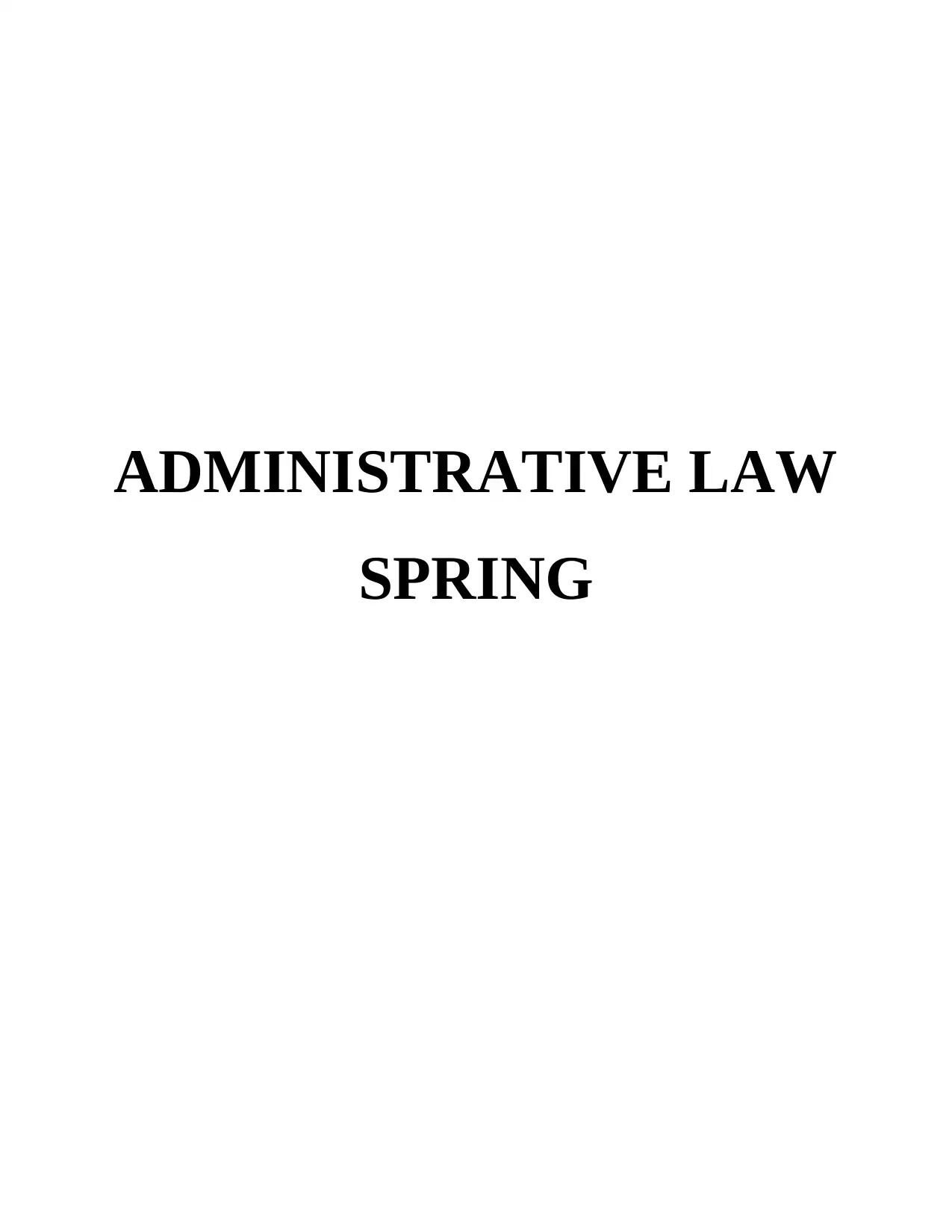
ADMINISTRATIVE LAW
SPRING
SPRING
Paraphrase This Document
Need a fresh take? Get an instant paraphrase of this document with our AI Paraphraser
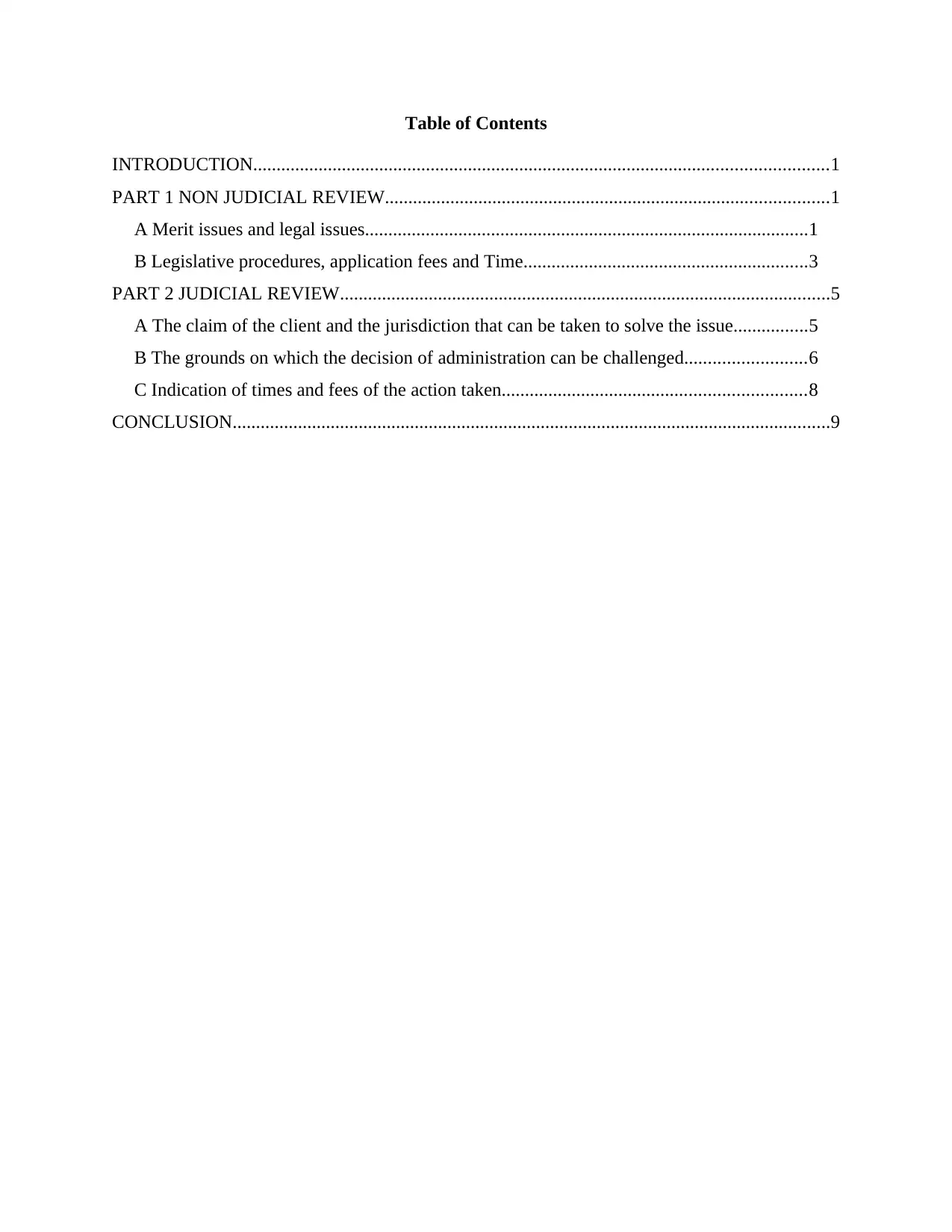
Table of Contents
INTRODUCTION...........................................................................................................................1
PART 1 NON JUDICIAL REVIEW...............................................................................................1
A Merit issues and legal issues...............................................................................................1
B Legislative procedures, application fees and Time.............................................................3
PART 2 JUDICIAL REVIEW.........................................................................................................5
A The claim of the client and the jurisdiction that can be taken to solve the issue................5
B The grounds on which the decision of administration can be challenged..........................6
C Indication of times and fees of the action taken.................................................................8
CONCLUSION................................................................................................................................9
INTRODUCTION...........................................................................................................................1
PART 1 NON JUDICIAL REVIEW...............................................................................................1
A Merit issues and legal issues...............................................................................................1
B Legislative procedures, application fees and Time.............................................................3
PART 2 JUDICIAL REVIEW.........................................................................................................5
A The claim of the client and the jurisdiction that can be taken to solve the issue................5
B The grounds on which the decision of administration can be challenged..........................6
C Indication of times and fees of the action taken.................................................................8
CONCLUSION................................................................................................................................9
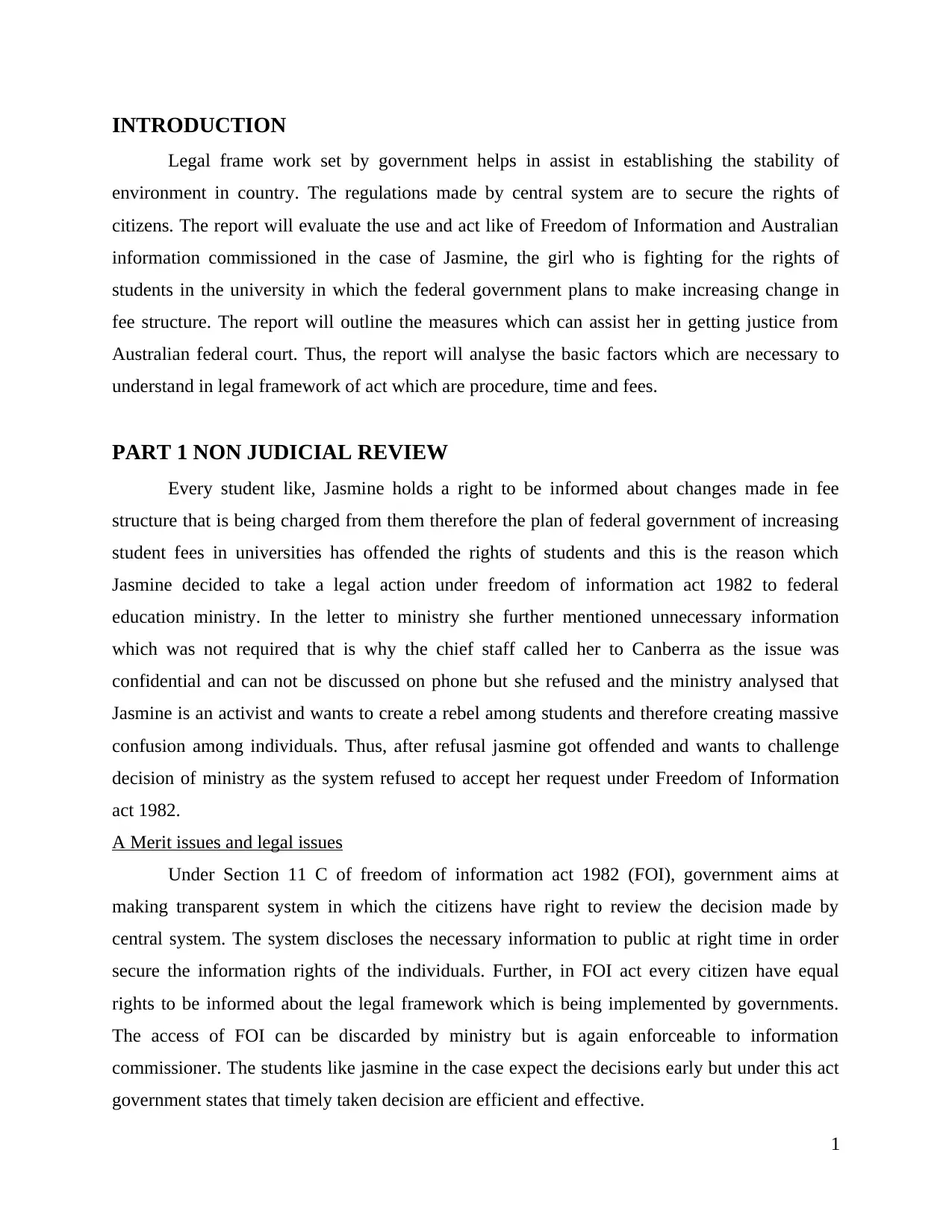
INTRODUCTION
Legal frame work set by government helps in assist in establishing the stability of
environment in country. The regulations made by central system are to secure the rights of
citizens. The report will evaluate the use and act like of Freedom of Information and Australian
information commissioned in the case of Jasmine, the girl who is fighting for the rights of
students in the university in which the federal government plans to make increasing change in
fee structure. The report will outline the measures which can assist her in getting justice from
Australian federal court. Thus, the report will analyse the basic factors which are necessary to
understand in legal framework of act which are procedure, time and fees.
PART 1 NON JUDICIAL REVIEW
Every student like, Jasmine holds a right to be informed about changes made in fee
structure that is being charged from them therefore the plan of federal government of increasing
student fees in universities has offended the rights of students and this is the reason which
Jasmine decided to take a legal action under freedom of information act 1982 to federal
education ministry. In the letter to ministry she further mentioned unnecessary information
which was not required that is why the chief staff called her to Canberra as the issue was
confidential and can not be discussed on phone but she refused and the ministry analysed that
Jasmine is an activist and wants to create a rebel among students and therefore creating massive
confusion among individuals. Thus, after refusal jasmine got offended and wants to challenge
decision of ministry as the system refused to accept her request under Freedom of Information
act 1982.
A Merit issues and legal issues
Under Section 11 C of freedom of information act 1982 (FOI), government aims at
making transparent system in which the citizens have right to review the decision made by
central system. The system discloses the necessary information to public at right time in order
secure the information rights of the individuals. Further, in FOI act every citizen have equal
rights to be informed about the legal framework which is being implemented by governments.
The access of FOI can be discarded by ministry but is again enforceable to information
commissioner. The students like jasmine in the case expect the decisions early but under this act
government states that timely taken decision are efficient and effective.
1
Legal frame work set by government helps in assist in establishing the stability of
environment in country. The regulations made by central system are to secure the rights of
citizens. The report will evaluate the use and act like of Freedom of Information and Australian
information commissioned in the case of Jasmine, the girl who is fighting for the rights of
students in the university in which the federal government plans to make increasing change in
fee structure. The report will outline the measures which can assist her in getting justice from
Australian federal court. Thus, the report will analyse the basic factors which are necessary to
understand in legal framework of act which are procedure, time and fees.
PART 1 NON JUDICIAL REVIEW
Every student like, Jasmine holds a right to be informed about changes made in fee
structure that is being charged from them therefore the plan of federal government of increasing
student fees in universities has offended the rights of students and this is the reason which
Jasmine decided to take a legal action under freedom of information act 1982 to federal
education ministry. In the letter to ministry she further mentioned unnecessary information
which was not required that is why the chief staff called her to Canberra as the issue was
confidential and can not be discussed on phone but she refused and the ministry analysed that
Jasmine is an activist and wants to create a rebel among students and therefore creating massive
confusion among individuals. Thus, after refusal jasmine got offended and wants to challenge
decision of ministry as the system refused to accept her request under Freedom of Information
act 1982.
A Merit issues and legal issues
Under Section 11 C of freedom of information act 1982 (FOI), government aims at
making transparent system in which the citizens have right to review the decision made by
central system. The system discloses the necessary information to public at right time in order
secure the information rights of the individuals. Further, in FOI act every citizen have equal
rights to be informed about the legal framework which is being implemented by governments.
The access of FOI can be discarded by ministry but is again enforceable to information
commissioner. The students like jasmine in the case expect the decisions early but under this act
government states that timely taken decision are efficient and effective.
1
⊘ This is a preview!⊘
Do you want full access?
Subscribe today to unlock all pages.

Trusted by 1+ million students worldwide
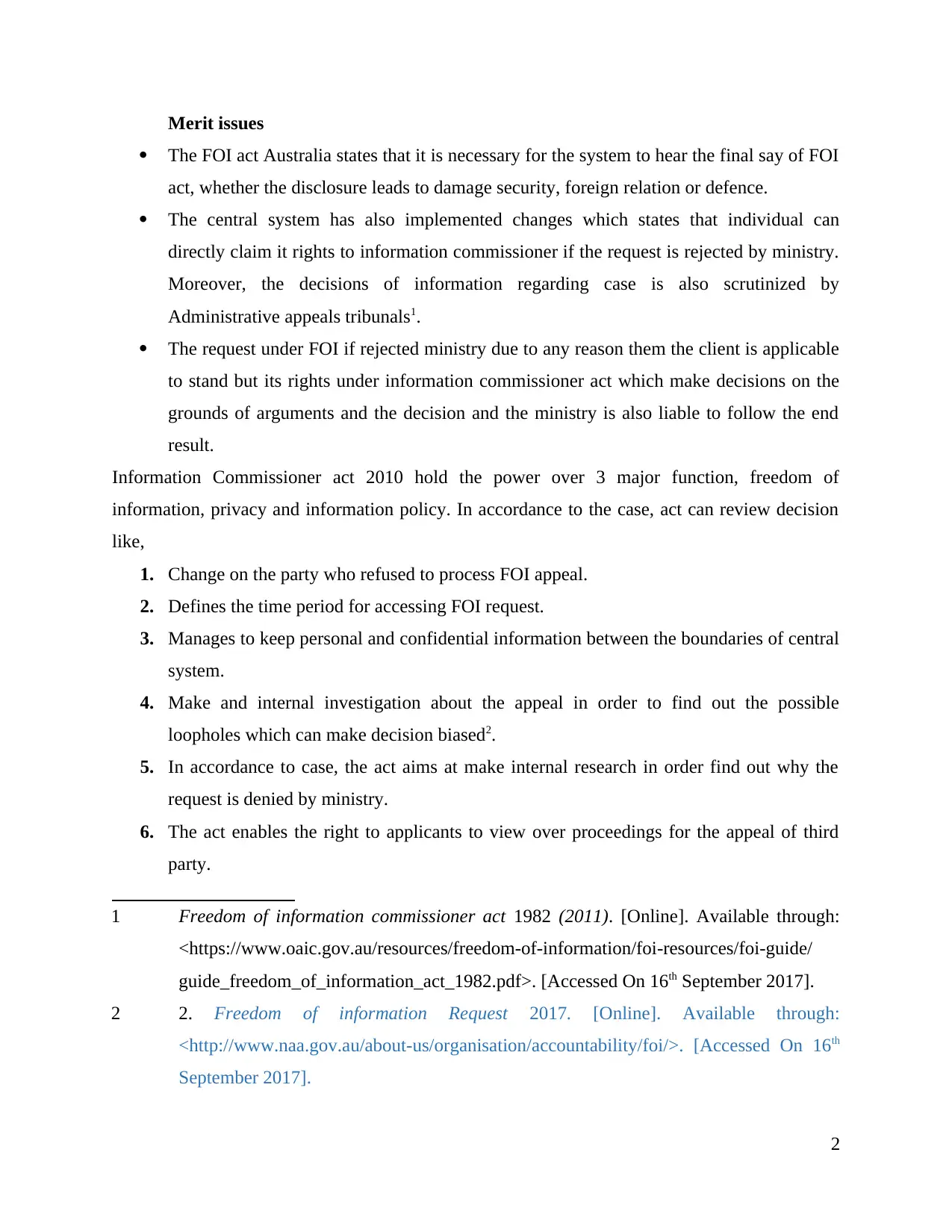
Merit issues
The FOI act Australia states that it is necessary for the system to hear the final say of FOI
act, whether the disclosure leads to damage security, foreign relation or defence.
The central system has also implemented changes which states that individual can
directly claim it rights to information commissioner if the request is rejected by ministry.
Moreover, the decisions of information regarding case is also scrutinized by
Administrative appeals tribunals1.
The request under FOI if rejected ministry due to any reason them the client is applicable
to stand but its rights under information commissioner act which make decisions on the
grounds of arguments and the decision and the ministry is also liable to follow the end
result.
Information Commissioner act 2010 hold the power over 3 major function, freedom of
information, privacy and information policy. In accordance to the case, act can review decision
like,
1. Change on the party who refused to process FOI appeal.
2. Defines the time period for accessing FOI request.
3. Manages to keep personal and confidential information between the boundaries of central
system.
4. Make and internal investigation about the appeal in order to find out the possible
loopholes which can make decision biased2.
5. In accordance to case, the act aims at make internal research in order find out why the
request is denied by ministry.
6. The act enables the right to applicants to view over proceedings for the appeal of third
party.
1 Freedom of information commissioner act 1982 (2011). [Online]. Available through:
<https://www.oaic.gov.au/resources/freedom-of-information/foi-resources/foi-guide/
guide_freedom_of_information_act_1982.pdf>. [Accessed On 16th September 2017].
2 2. Freedom of information Request 2017. [Online]. Available through:
<http://www.naa.gov.au/about-us/organisation/accountability/foi/>. [Accessed On 16th
September 2017].
2
The FOI act Australia states that it is necessary for the system to hear the final say of FOI
act, whether the disclosure leads to damage security, foreign relation or defence.
The central system has also implemented changes which states that individual can
directly claim it rights to information commissioner if the request is rejected by ministry.
Moreover, the decisions of information regarding case is also scrutinized by
Administrative appeals tribunals1.
The request under FOI if rejected ministry due to any reason them the client is applicable
to stand but its rights under information commissioner act which make decisions on the
grounds of arguments and the decision and the ministry is also liable to follow the end
result.
Information Commissioner act 2010 hold the power over 3 major function, freedom of
information, privacy and information policy. In accordance to the case, act can review decision
like,
1. Change on the party who refused to process FOI appeal.
2. Defines the time period for accessing FOI request.
3. Manages to keep personal and confidential information between the boundaries of central
system.
4. Make and internal investigation about the appeal in order to find out the possible
loopholes which can make decision biased2.
5. In accordance to case, the act aims at make internal research in order find out why the
request is denied by ministry.
6. The act enables the right to applicants to view over proceedings for the appeal of third
party.
1 Freedom of information commissioner act 1982 (2011). [Online]. Available through:
<https://www.oaic.gov.au/resources/freedom-of-information/foi-resources/foi-guide/
guide_freedom_of_information_act_1982.pdf>. [Accessed On 16th September 2017].
2 2. Freedom of information Request 2017. [Online]. Available through:
<http://www.naa.gov.au/about-us/organisation/accountability/foi/>. [Accessed On 16th
September 2017].
2
Paraphrase This Document
Need a fresh take? Get an instant paraphrase of this document with our AI Paraphraser
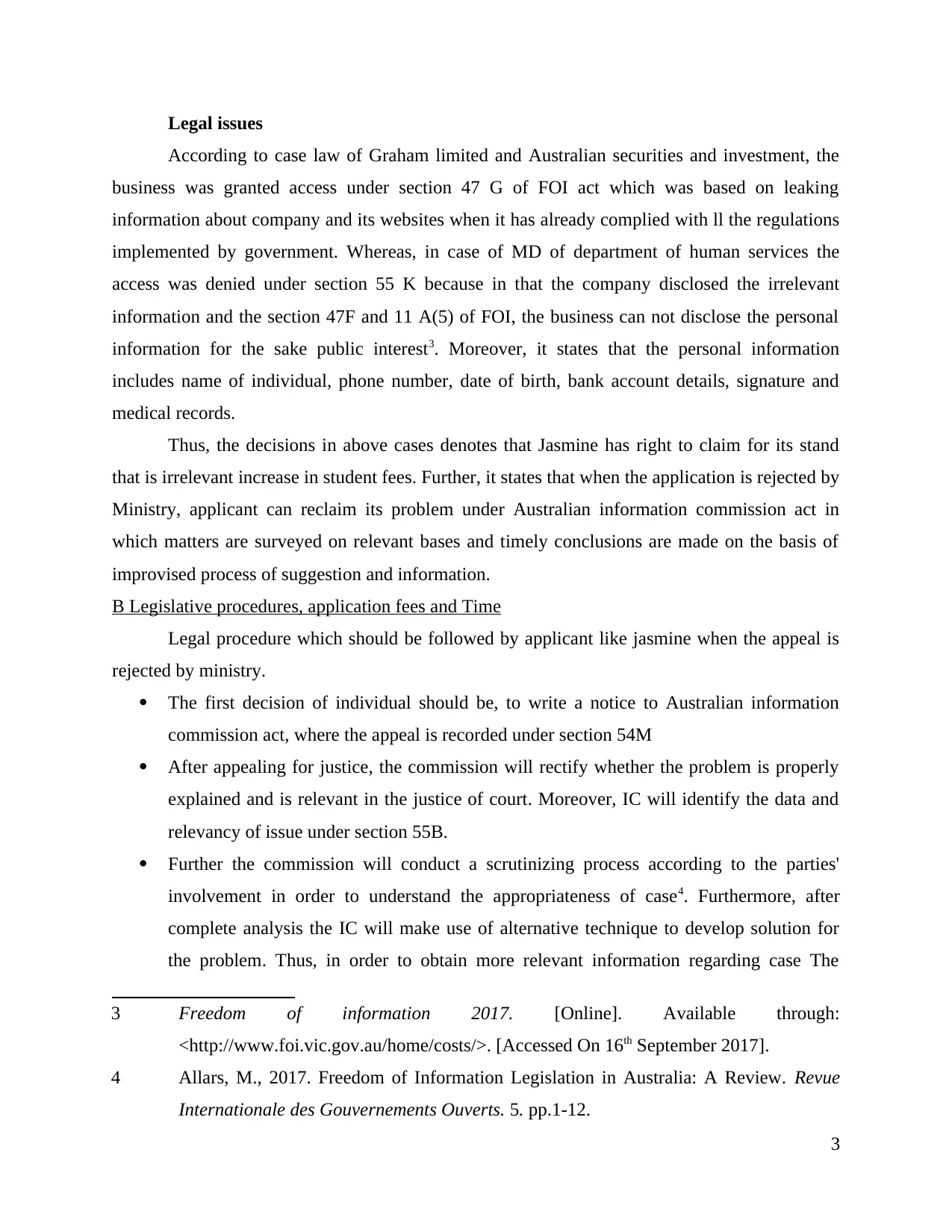
Legal issues
According to case law of Graham limited and Australian securities and investment, the
business was granted access under section 47 G of FOI act which was based on leaking
information about company and its websites when it has already complied with ll the regulations
implemented by government. Whereas, in case of MD of department of human services the
access was denied under section 55 K because in that the company disclosed the irrelevant
information and the section 47F and 11 A(5) of FOI, the business can not disclose the personal
information for the sake public interest3. Moreover, it states that the personal information
includes name of individual, phone number, date of birth, bank account details, signature and
medical records.
Thus, the decisions in above cases denotes that Jasmine has right to claim for its stand
that is irrelevant increase in student fees. Further, it states that when the application is rejected by
Ministry, applicant can reclaim its problem under Australian information commission act in
which matters are surveyed on relevant bases and timely conclusions are made on the basis of
improvised process of suggestion and information.
B Legislative procedures, application fees and Time
Legal procedure which should be followed by applicant like jasmine when the appeal is
rejected by ministry.
The first decision of individual should be, to write a notice to Australian information
commission act, where the appeal is recorded under section 54M
After appealing for justice, the commission will rectify whether the problem is properly
explained and is relevant in the justice of court. Moreover, IC will identify the data and
relevancy of issue under section 55B.
Further the commission will conduct a scrutinizing process according to the parties'
involvement in order to understand the appropriateness of case4. Furthermore, after
complete analysis the IC will make use of alternative technique to develop solution for
the problem. Thus, in order to obtain more relevant information regarding case The
3 Freedom of information 2017. [Online]. Available through:
<http://www.foi.vic.gov.au/home/costs/>. [Accessed On 16th September 2017].
4 Allars, M., 2017. Freedom of Information Legislation in Australia: A Review. Revue
Internationale des Gouvernements Ouverts. 5. pp.1-12.
3
According to case law of Graham limited and Australian securities and investment, the
business was granted access under section 47 G of FOI act which was based on leaking
information about company and its websites when it has already complied with ll the regulations
implemented by government. Whereas, in case of MD of department of human services the
access was denied under section 55 K because in that the company disclosed the irrelevant
information and the section 47F and 11 A(5) of FOI, the business can not disclose the personal
information for the sake public interest3. Moreover, it states that the personal information
includes name of individual, phone number, date of birth, bank account details, signature and
medical records.
Thus, the decisions in above cases denotes that Jasmine has right to claim for its stand
that is irrelevant increase in student fees. Further, it states that when the application is rejected by
Ministry, applicant can reclaim its problem under Australian information commission act in
which matters are surveyed on relevant bases and timely conclusions are made on the basis of
improvised process of suggestion and information.
B Legislative procedures, application fees and Time
Legal procedure which should be followed by applicant like jasmine when the appeal is
rejected by ministry.
The first decision of individual should be, to write a notice to Australian information
commission act, where the appeal is recorded under section 54M
After appealing for justice, the commission will rectify whether the problem is properly
explained and is relevant in the justice of court. Moreover, IC will identify the data and
relevancy of issue under section 55B.
Further the commission will conduct a scrutinizing process according to the parties'
involvement in order to understand the appropriateness of case4. Furthermore, after
complete analysis the IC will make use of alternative technique to develop solution for
the problem. Thus, in order to obtain more relevant information regarding case The
3 Freedom of information 2017. [Online]. Available through:
<http://www.foi.vic.gov.au/home/costs/>. [Accessed On 16th September 2017].
4 Allars, M., 2017. Freedom of Information Legislation in Australia: A Review. Revue
Internationale des Gouvernements Ouverts. 5. pp.1-12.
3
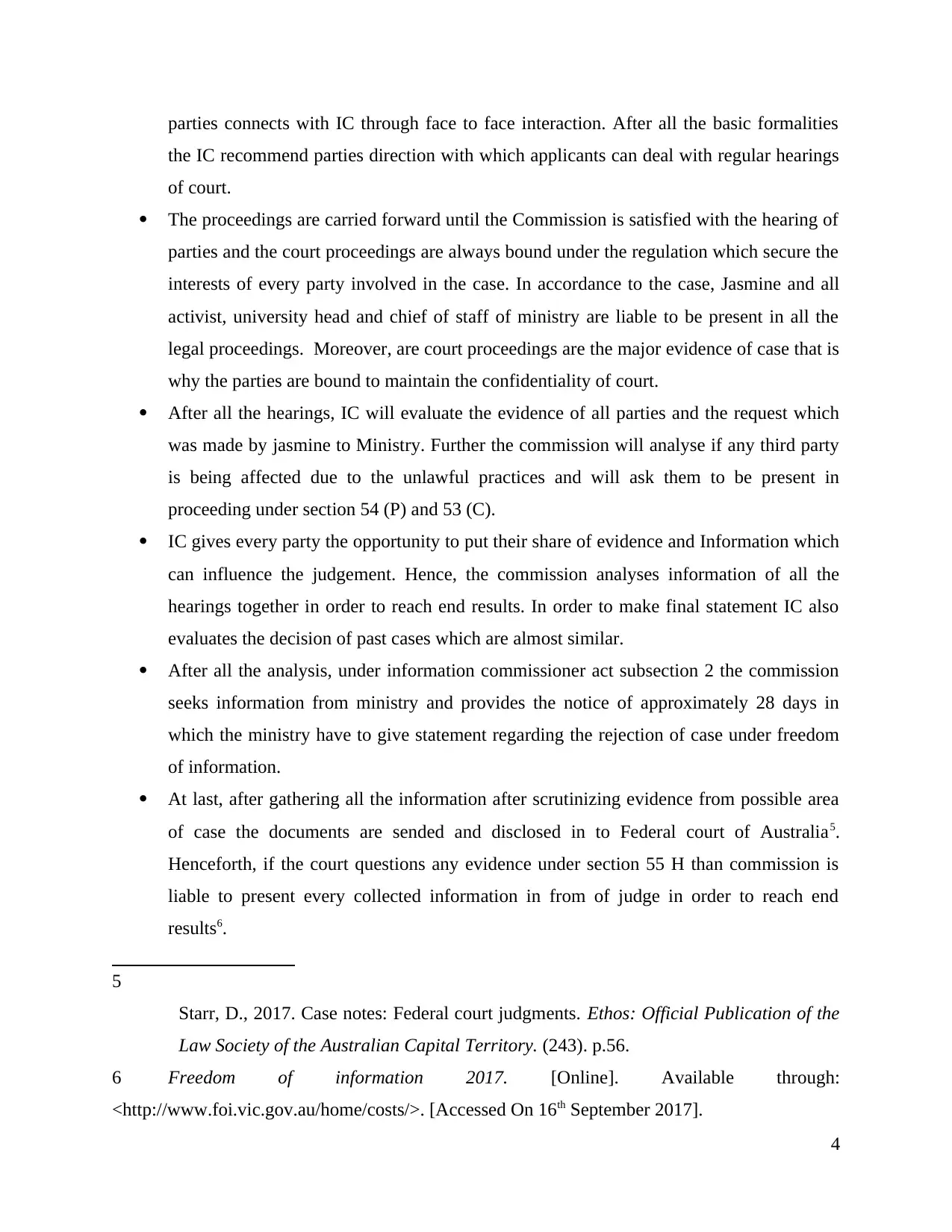
parties connects with IC through face to face interaction. After all the basic formalities
the IC recommend parties direction with which applicants can deal with regular hearings
of court.
The proceedings are carried forward until the Commission is satisfied with the hearing of
parties and the court proceedings are always bound under the regulation which secure the
interests of every party involved in the case. In accordance to the case, Jasmine and all
activist, university head and chief of staff of ministry are liable to be present in all the
legal proceedings. Moreover, are court proceedings are the major evidence of case that is
why the parties are bound to maintain the confidentiality of court.
After all the hearings, IC will evaluate the evidence of all parties and the request which
was made by jasmine to Ministry. Further the commission will analyse if any third party
is being affected due to the unlawful practices and will ask them to be present in
proceeding under section 54 (P) and 53 (C).
IC gives every party the opportunity to put their share of evidence and Information which
can influence the judgement. Hence, the commission analyses information of all the
hearings together in order to reach end results. In order to make final statement IC also
evaluates the decision of past cases which are almost similar.
After all the analysis, under information commissioner act subsection 2 the commission
seeks information from ministry and provides the notice of approximately 28 days in
which the ministry have to give statement regarding the rejection of case under freedom
of information.
At last, after gathering all the information after scrutinizing evidence from possible area
of case the documents are sended and disclosed in to Federal court of Australia5.
Henceforth, if the court questions any evidence under section 55 H than commission is
liable to present every collected information in from of judge in order to reach end
results6.
5
Starr, D., 2017. Case notes: Federal court judgments. Ethos: Official Publication of the
Law Society of the Australian Capital Territory. (243). p.56.
6 Freedom of information 2017. [Online]. Available through:
<http://www.foi.vic.gov.au/home/costs/>. [Accessed On 16th September 2017].
4
the IC recommend parties direction with which applicants can deal with regular hearings
of court.
The proceedings are carried forward until the Commission is satisfied with the hearing of
parties and the court proceedings are always bound under the regulation which secure the
interests of every party involved in the case. In accordance to the case, Jasmine and all
activist, university head and chief of staff of ministry are liable to be present in all the
legal proceedings. Moreover, are court proceedings are the major evidence of case that is
why the parties are bound to maintain the confidentiality of court.
After all the hearings, IC will evaluate the evidence of all parties and the request which
was made by jasmine to Ministry. Further the commission will analyse if any third party
is being affected due to the unlawful practices and will ask them to be present in
proceeding under section 54 (P) and 53 (C).
IC gives every party the opportunity to put their share of evidence and Information which
can influence the judgement. Hence, the commission analyses information of all the
hearings together in order to reach end results. In order to make final statement IC also
evaluates the decision of past cases which are almost similar.
After all the analysis, under information commissioner act subsection 2 the commission
seeks information from ministry and provides the notice of approximately 28 days in
which the ministry have to give statement regarding the rejection of case under freedom
of information.
At last, after gathering all the information after scrutinizing evidence from possible area
of case the documents are sended and disclosed in to Federal court of Australia5.
Henceforth, if the court questions any evidence under section 55 H than commission is
liable to present every collected information in from of judge in order to reach end
results6.
5
Starr, D., 2017. Case notes: Federal court judgments. Ethos: Official Publication of the
Law Society of the Australian Capital Territory. (243). p.56.
6 Freedom of information 2017. [Online]. Available through:
<http://www.foi.vic.gov.au/home/costs/>. [Accessed On 16th September 2017].
4
⊘ This is a preview!⊘
Do you want full access?
Subscribe today to unlock all pages.

Trusted by 1+ million students worldwide
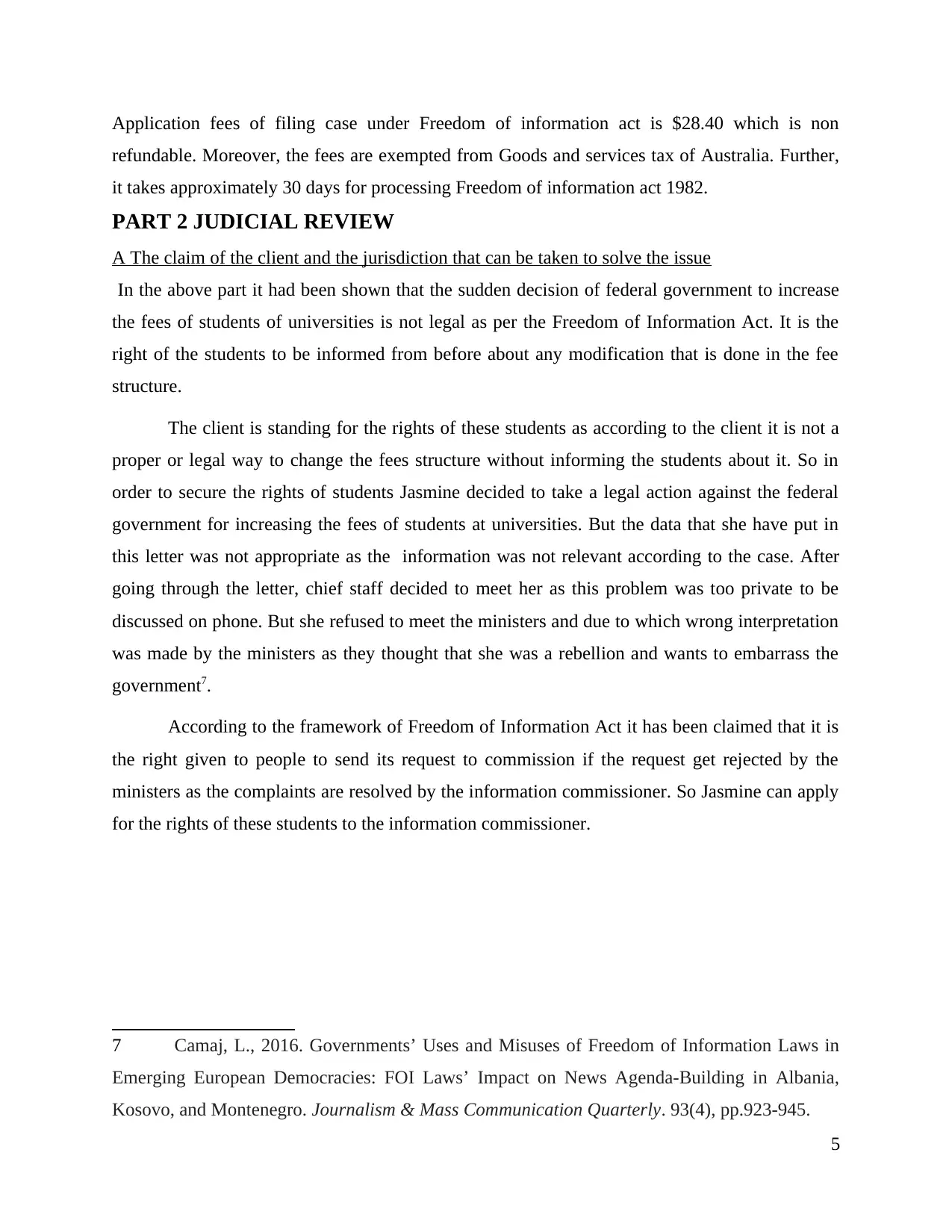
Application fees of filing case under Freedom of information act is $28.40 which is non
refundable. Moreover, the fees are exempted from Goods and services tax of Australia. Further,
it takes approximately 30 days for processing Freedom of information act 1982.
PART 2 JUDICIAL REVIEW
A The claim of the client and the jurisdiction that can be taken to solve the issue
In the above part it had been shown that the sudden decision of federal government to increase
the fees of students of universities is not legal as per the Freedom of Information Act. It is the
right of the students to be informed from before about any modification that is done in the fee
structure.
The client is standing for the rights of these students as according to the client it is not a
proper or legal way to change the fees structure without informing the students about it. So in
order to secure the rights of students Jasmine decided to take a legal action against the federal
government for increasing the fees of students at universities. But the data that she have put in
this letter was not appropriate as the information was not relevant according to the case. After
going through the letter, chief staff decided to meet her as this problem was too private to be
discussed on phone. But she refused to meet the ministers and due to which wrong interpretation
was made by the ministers as they thought that she was a rebellion and wants to embarrass the
government7.
According to the framework of Freedom of Information Act it has been claimed that it is
the right given to people to send its request to commission if the request get rejected by the
ministers as the complaints are resolved by the information commissioner. So Jasmine can apply
for the rights of these students to the information commissioner.
7 Camaj, L., 2016. Governments’ Uses and Misuses of Freedom of Information Laws in
Emerging European Democracies: FOI Laws’ Impact on News Agenda-Building in Albania,
Kosovo, and Montenegro. Journalism & Mass Communication Quarterly. 93(4), pp.923-945.
5
refundable. Moreover, the fees are exempted from Goods and services tax of Australia. Further,
it takes approximately 30 days for processing Freedom of information act 1982.
PART 2 JUDICIAL REVIEW
A The claim of the client and the jurisdiction that can be taken to solve the issue
In the above part it had been shown that the sudden decision of federal government to increase
the fees of students of universities is not legal as per the Freedom of Information Act. It is the
right of the students to be informed from before about any modification that is done in the fee
structure.
The client is standing for the rights of these students as according to the client it is not a
proper or legal way to change the fees structure without informing the students about it. So in
order to secure the rights of students Jasmine decided to take a legal action against the federal
government for increasing the fees of students at universities. But the data that she have put in
this letter was not appropriate as the information was not relevant according to the case. After
going through the letter, chief staff decided to meet her as this problem was too private to be
discussed on phone. But she refused to meet the ministers and due to which wrong interpretation
was made by the ministers as they thought that she was a rebellion and wants to embarrass the
government7.
According to the framework of Freedom of Information Act it has been claimed that it is
the right given to people to send its request to commission if the request get rejected by the
ministers as the complaints are resolved by the information commissioner. So Jasmine can apply
for the rights of these students to the information commissioner.
7 Camaj, L., 2016. Governments’ Uses and Misuses of Freedom of Information Laws in
Emerging European Democracies: FOI Laws’ Impact on News Agenda-Building in Albania,
Kosovo, and Montenegro. Journalism & Mass Communication Quarterly. 93(4), pp.923-945.
5
Paraphrase This Document
Need a fresh take? Get an instant paraphrase of this document with our AI Paraphraser
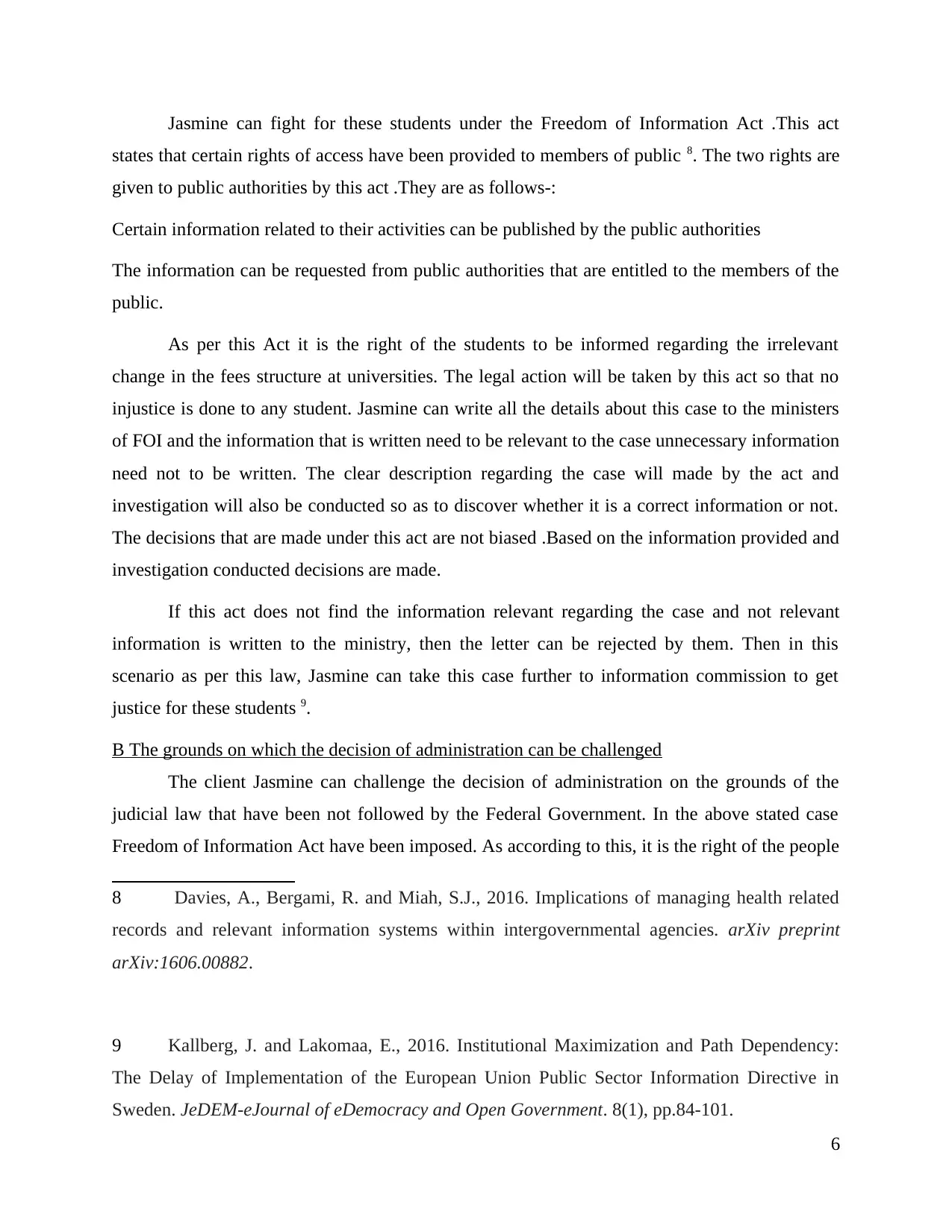
Jasmine can fight for these students under the Freedom of Information Act .This act
states that certain rights of access have been provided to members of public 8. The two rights are
given to public authorities by this act .They are as follows-:
Certain information related to their activities can be published by the public authorities
The information can be requested from public authorities that are entitled to the members of the
public.
As per this Act it is the right of the students to be informed regarding the irrelevant
change in the fees structure at universities. The legal action will be taken by this act so that no
injustice is done to any student. Jasmine can write all the details about this case to the ministers
of FOI and the information that is written need to be relevant to the case unnecessary information
need not to be written. The clear description regarding the case will made by the act and
investigation will also be conducted so as to discover whether it is a correct information or not.
The decisions that are made under this act are not biased .Based on the information provided and
investigation conducted decisions are made.
If this act does not find the information relevant regarding the case and not relevant
information is written to the ministry, then the letter can be rejected by them. Then in this
scenario as per this law, Jasmine can take this case further to information commission to get
justice for these students 9.
B The grounds on which the decision of administration can be challenged
The client Jasmine can challenge the decision of administration on the grounds of the
judicial law that have been not followed by the Federal Government. In the above stated case
Freedom of Information Act have been imposed. As according to this, it is the right of the people
8 Davies, A., Bergami, R. and Miah, S.J., 2016. Implications of managing health related
records and relevant information systems within intergovernmental agencies. arXiv preprint
arXiv:1606.00882.
9 Kallberg, J. and Lakomaa, E., 2016. Institutional Maximization and Path Dependency:
The Delay of Implementation of the European Union Public Sector Information Directive in
Sweden. JeDEM-eJournal of eDemocracy and Open Government. 8(1), pp.84-101.
6
states that certain rights of access have been provided to members of public 8. The two rights are
given to public authorities by this act .They are as follows-:
Certain information related to their activities can be published by the public authorities
The information can be requested from public authorities that are entitled to the members of the
public.
As per this Act it is the right of the students to be informed regarding the irrelevant
change in the fees structure at universities. The legal action will be taken by this act so that no
injustice is done to any student. Jasmine can write all the details about this case to the ministers
of FOI and the information that is written need to be relevant to the case unnecessary information
need not to be written. The clear description regarding the case will made by the act and
investigation will also be conducted so as to discover whether it is a correct information or not.
The decisions that are made under this act are not biased .Based on the information provided and
investigation conducted decisions are made.
If this act does not find the information relevant regarding the case and not relevant
information is written to the ministry, then the letter can be rejected by them. Then in this
scenario as per this law, Jasmine can take this case further to information commission to get
justice for these students 9.
B The grounds on which the decision of administration can be challenged
The client Jasmine can challenge the decision of administration on the grounds of the
judicial law that have been not followed by the Federal Government. In the above stated case
Freedom of Information Act have been imposed. As according to this, it is the right of the people
8 Davies, A., Bergami, R. and Miah, S.J., 2016. Implications of managing health related
records and relevant information systems within intergovernmental agencies. arXiv preprint
arXiv:1606.00882.
9 Kallberg, J. and Lakomaa, E., 2016. Institutional Maximization and Path Dependency:
The Delay of Implementation of the European Union Public Sector Information Directive in
Sweden. JeDEM-eJournal of eDemocracy and Open Government. 8(1), pp.84-101.
6
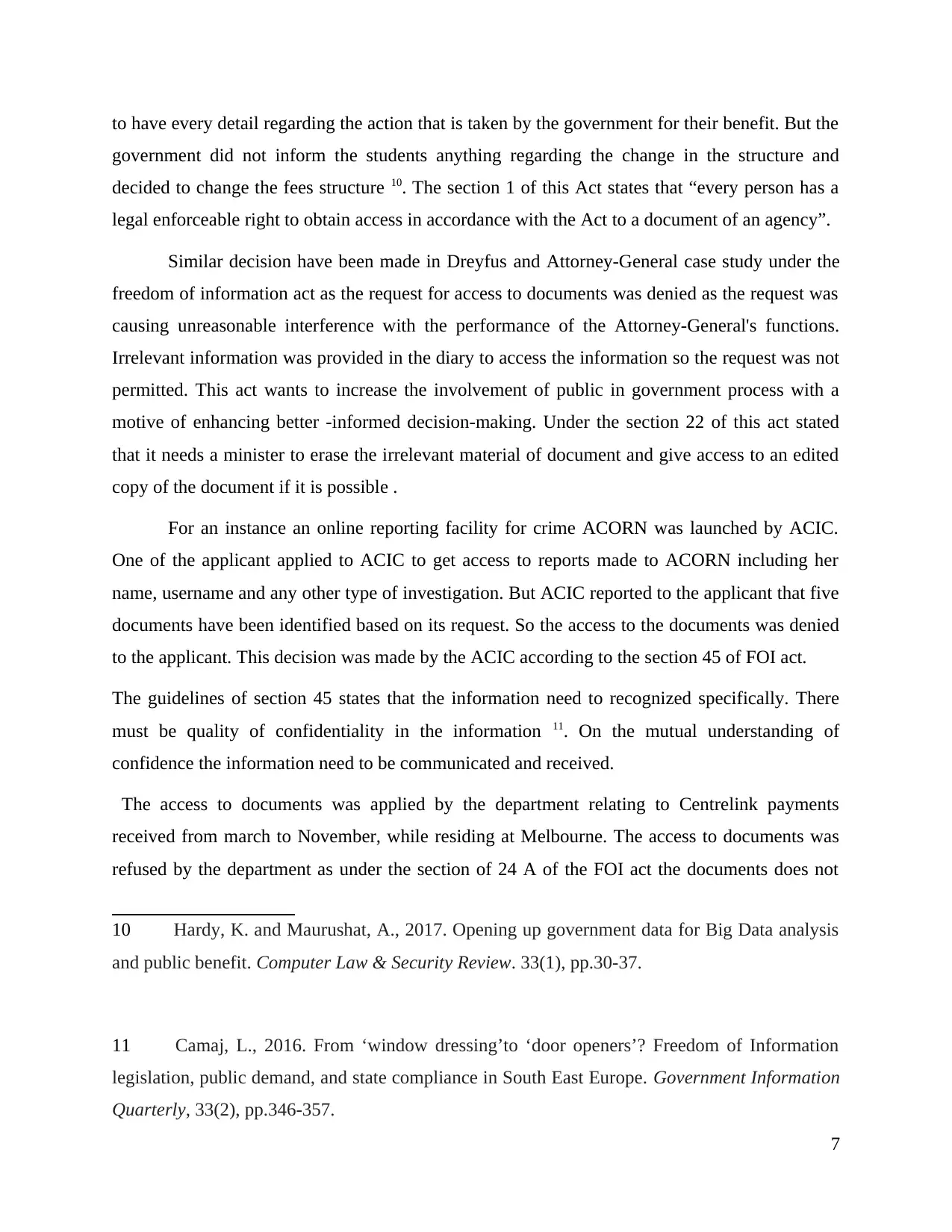
to have every detail regarding the action that is taken by the government for their benefit. But the
government did not inform the students anything regarding the change in the structure and
decided to change the fees structure 10. The section 1 of this Act states that “every person has a
legal enforceable right to obtain access in accordance with the Act to a document of an agency”.
Similar decision have been made in Dreyfus and Attorney-General case study under the
freedom of information act as the request for access to documents was denied as the request was
causing unreasonable interference with the performance of the Attorney-General's functions.
Irrelevant information was provided in the diary to access the information so the request was not
permitted. This act wants to increase the involvement of public in government process with a
motive of enhancing better -informed decision-making. Under the section 22 of this act stated
that it needs a minister to erase the irrelevant material of document and give access to an edited
copy of the document if it is possible .
For an instance an online reporting facility for crime ACORN was launched by ACIC.
One of the applicant applied to ACIC to get access to reports made to ACORN including her
name, username and any other type of investigation. But ACIC reported to the applicant that five
documents have been identified based on its request. So the access to the documents was denied
to the applicant. This decision was made by the ACIC according to the section 45 of FOI act.
The guidelines of section 45 states that the information need to recognized specifically. There
must be quality of confidentiality in the information 11. On the mutual understanding of
confidence the information need to be communicated and received.
The access to documents was applied by the department relating to Centrelink payments
received from march to November, while residing at Melbourne. The access to documents was
refused by the department as under the section of 24 A of the FOI act the documents does not
10 Hardy, K. and Maurushat, A., 2017. Opening up government data for Big Data analysis
and public benefit. Computer Law & Security Review. 33(1), pp.30-37.
11 Camaj, L., 2016. From ‘window dressing’to ‘door openers’? Freedom of Information
legislation, public demand, and state compliance in South East Europe. Government Information
Quarterly, 33(2), pp.346-357.
7
government did not inform the students anything regarding the change in the structure and
decided to change the fees structure 10. The section 1 of this Act states that “every person has a
legal enforceable right to obtain access in accordance with the Act to a document of an agency”.
Similar decision have been made in Dreyfus and Attorney-General case study under the
freedom of information act as the request for access to documents was denied as the request was
causing unreasonable interference with the performance of the Attorney-General's functions.
Irrelevant information was provided in the diary to access the information so the request was not
permitted. This act wants to increase the involvement of public in government process with a
motive of enhancing better -informed decision-making. Under the section 22 of this act stated
that it needs a minister to erase the irrelevant material of document and give access to an edited
copy of the document if it is possible .
For an instance an online reporting facility for crime ACORN was launched by ACIC.
One of the applicant applied to ACIC to get access to reports made to ACORN including her
name, username and any other type of investigation. But ACIC reported to the applicant that five
documents have been identified based on its request. So the access to the documents was denied
to the applicant. This decision was made by the ACIC according to the section 45 of FOI act.
The guidelines of section 45 states that the information need to recognized specifically. There
must be quality of confidentiality in the information 11. On the mutual understanding of
confidence the information need to be communicated and received.
The access to documents was applied by the department relating to Centrelink payments
received from march to November, while residing at Melbourne. The access to documents was
refused by the department as under the section of 24 A of the FOI act the documents does not
10 Hardy, K. and Maurushat, A., 2017. Opening up government data for Big Data analysis
and public benefit. Computer Law & Security Review. 33(1), pp.30-37.
11 Camaj, L., 2016. From ‘window dressing’to ‘door openers’? Freedom of Information
legislation, public demand, and state compliance in South East Europe. Government Information
Quarterly, 33(2), pp.346-357.
7
⊘ This is a preview!⊘
Do you want full access?
Subscribe today to unlock all pages.

Trusted by 1+ million students worldwide
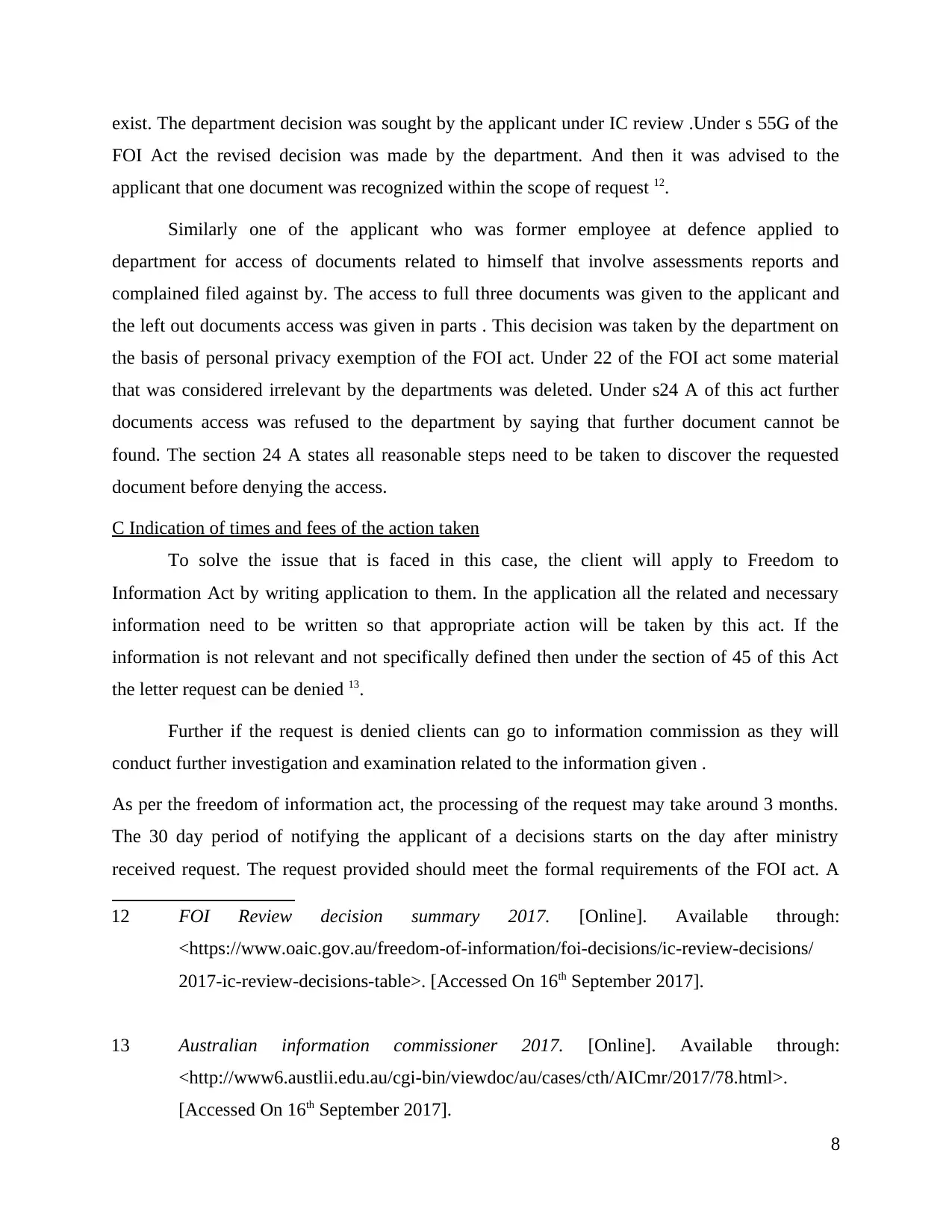
exist. The department decision was sought by the applicant under IC review .Under s 55G of the
FOI Act the revised decision was made by the department. And then it was advised to the
applicant that one document was recognized within the scope of request 12.
Similarly one of the applicant who was former employee at defence applied to
department for access of documents related to himself that involve assessments reports and
complained filed against by. The access to full three documents was given to the applicant and
the left out documents access was given in parts . This decision was taken by the department on
the basis of personal privacy exemption of the FOI act. Under 22 of the FOI act some material
that was considered irrelevant by the departments was deleted. Under s24 A of this act further
documents access was refused to the department by saying that further document cannot be
found. The section 24 A states all reasonable steps need to be taken to discover the requested
document before denying the access.
C Indication of times and fees of the action taken
To solve the issue that is faced in this case, the client will apply to Freedom to
Information Act by writing application to them. In the application all the related and necessary
information need to be written so that appropriate action will be taken by this act. If the
information is not relevant and not specifically defined then under the section of 45 of this Act
the letter request can be denied 13.
Further if the request is denied clients can go to information commission as they will
conduct further investigation and examination related to the information given .
As per the freedom of information act, the processing of the request may take around 3 months.
The 30 day period of notifying the applicant of a decisions starts on the day after ministry
received request. The request provided should meet the formal requirements of the FOI act. A
12 FOI Review decision summary 2017. [Online]. Available through:
<https://www.oaic.gov.au/freedom-of-information/foi-decisions/ic-review-decisions/
2017-ic-review-decisions-table>. [Accessed On 16th September 2017].
13 Australian information commissioner 2017. [Online]. Available through:
<http://www6.austlii.edu.au/cgi-bin/viewdoc/au/cases/cth/AICmr/2017/78.html>.
[Accessed On 16th September 2017].
8
FOI Act the revised decision was made by the department. And then it was advised to the
applicant that one document was recognized within the scope of request 12.
Similarly one of the applicant who was former employee at defence applied to
department for access of documents related to himself that involve assessments reports and
complained filed against by. The access to full three documents was given to the applicant and
the left out documents access was given in parts . This decision was taken by the department on
the basis of personal privacy exemption of the FOI act. Under 22 of the FOI act some material
that was considered irrelevant by the departments was deleted. Under s24 A of this act further
documents access was refused to the department by saying that further document cannot be
found. The section 24 A states all reasonable steps need to be taken to discover the requested
document before denying the access.
C Indication of times and fees of the action taken
To solve the issue that is faced in this case, the client will apply to Freedom to
Information Act by writing application to them. In the application all the related and necessary
information need to be written so that appropriate action will be taken by this act. If the
information is not relevant and not specifically defined then under the section of 45 of this Act
the letter request can be denied 13.
Further if the request is denied clients can go to information commission as they will
conduct further investigation and examination related to the information given .
As per the freedom of information act, the processing of the request may take around 3 months.
The 30 day period of notifying the applicant of a decisions starts on the day after ministry
received request. The request provided should meet the formal requirements of the FOI act. A
12 FOI Review decision summary 2017. [Online]. Available through:
<https://www.oaic.gov.au/freedom-of-information/foi-decisions/ic-review-decisions/
2017-ic-review-decisions-table>. [Accessed On 16th September 2017].
13 Australian information commissioner 2017. [Online]. Available through:
<http://www6.austlii.edu.au/cgi-bin/viewdoc/au/cases/cth/AICmr/2017/78.html>.
[Accessed On 16th September 2017].
8
Paraphrase This Document
Need a fresh take? Get an instant paraphrase of this document with our AI Paraphraser
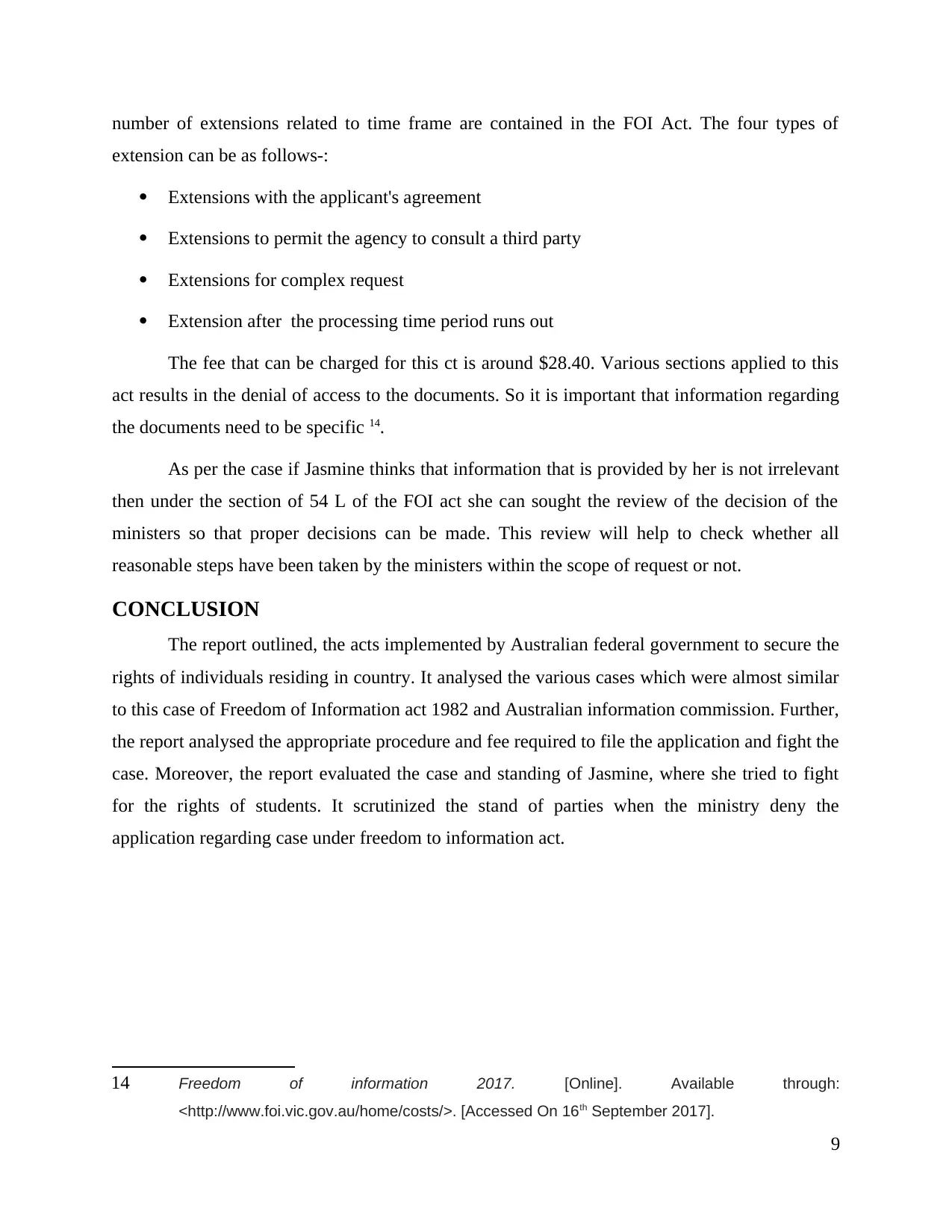
number of extensions related to time frame are contained in the FOI Act. The four types of
extension can be as follows-:
Extensions with the applicant's agreement
Extensions to permit the agency to consult a third party
Extensions for complex request
Extension after the processing time period runs out
The fee that can be charged for this ct is around $28.40. Various sections applied to this
act results in the denial of access to the documents. So it is important that information regarding
the documents need to be specific 14.
As per the case if Jasmine thinks that information that is provided by her is not irrelevant
then under the section of 54 L of the FOI act she can sought the review of the decision of the
ministers so that proper decisions can be made. This review will help to check whether all
reasonable steps have been taken by the ministers within the scope of request or not.
CONCLUSION
The report outlined, the acts implemented by Australian federal government to secure the
rights of individuals residing in country. It analysed the various cases which were almost similar
to this case of Freedom of Information act 1982 and Australian information commission. Further,
the report analysed the appropriate procedure and fee required to file the application and fight the
case. Moreover, the report evaluated the case and standing of Jasmine, where she tried to fight
for the rights of students. It scrutinized the stand of parties when the ministry deny the
application regarding case under freedom to information act.
14 Freedom of information 2017. [Online]. Available through:
<http://www.foi.vic.gov.au/home/costs/>. [Accessed On 16th September 2017].
9
extension can be as follows-:
Extensions with the applicant's agreement
Extensions to permit the agency to consult a third party
Extensions for complex request
Extension after the processing time period runs out
The fee that can be charged for this ct is around $28.40. Various sections applied to this
act results in the denial of access to the documents. So it is important that information regarding
the documents need to be specific 14.
As per the case if Jasmine thinks that information that is provided by her is not irrelevant
then under the section of 54 L of the FOI act she can sought the review of the decision of the
ministers so that proper decisions can be made. This review will help to check whether all
reasonable steps have been taken by the ministers within the scope of request or not.
CONCLUSION
The report outlined, the acts implemented by Australian federal government to secure the
rights of individuals residing in country. It analysed the various cases which were almost similar
to this case of Freedom of Information act 1982 and Australian information commission. Further,
the report analysed the appropriate procedure and fee required to file the application and fight the
case. Moreover, the report evaluated the case and standing of Jasmine, where she tried to fight
for the rights of students. It scrutinized the stand of parties when the ministry deny the
application regarding case under freedom to information act.
14 Freedom of information 2017. [Online]. Available through:
<http://www.foi.vic.gov.au/home/costs/>. [Accessed On 16th September 2017].
9

10
⊘ This is a preview!⊘
Do you want full access?
Subscribe today to unlock all pages.

Trusted by 1+ million students worldwide
1 out of 12
Related Documents
Your All-in-One AI-Powered Toolkit for Academic Success.
+13062052269
info@desklib.com
Available 24*7 on WhatsApp / Email
![[object Object]](/_next/static/media/star-bottom.7253800d.svg)
Unlock your academic potential
Copyright © 2020–2025 A2Z Services. All Rights Reserved. Developed and managed by ZUCOL.





